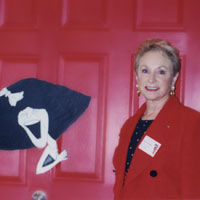Paula Berke MSW '79
March 01, 2007- Alumni

When her daughter was diagnosed with cancer eight years ago, Paula Berke wasn't sure what to do or where to turn for support. She was living in California, and her daughter was in Tennessee. So Berke packed her bags and went to Nashville, not knowing what she would find once she got there.
Little did she know that her daughter would find the help they both needed and the inspiration for Berke's own way to help those touched by cancer.
Berke, who graduated from the USC School of Social Work in 1979, is the founder of Gilda's Club Desert Cities, the first and only California club location. Headquartered in New York with branches across North America, Gilda's Club is an organization named after "Saturday Night Live" comedienne Gilda Radner, who lost her battle with ovarian cancer in 1989. The clubs are dedicated to providing social and emotional support for those with cancer and their friends and family.
Before going to the Nashville Gilda's Club, Berke had never seen or heard of a place like it before. "It totally turned us around 180 degrees on how we looked at [my daughter's] journey through breast cancer," she said.
Berke, her daughter and her daughter's family dove right in, attending support groups, potluck dinners and holiday activities, all while meeting other families in their same situation along the way. "You certainly got more than you gave [at the club]," Berke said. "At Gilda's Club, it's about learning to live with cancer no matter what the outcome."
When Berke went back home to Rancho Mirage, Calif., she compared notes with a friend whose daughter had also been diagnosed with cancer. "There was no comparison," Berke said. Berke had received so much helpful information and support through the Nashville Gilda's Club, but her friend had none of that. Berke knew she had to start her own club.
She enlisted the help of Judy Wolfe, a licensed social worker; Estelle Cooper, who had previous experience setting up an organization like Gilda's Club; and Phyllis Greene, who was a computer expert. It took about a year to gather all the appropriate information to show there was a need for such a place in the Coachella Valley and to show that it could sustain itself financially. Berke started out with 25 donors.
Gilda's Club Desert Cities opened in Cathedral City, Calif., in 2004 after renovating a burned-out building with materials donated by the local community. "We started with nothing but a big mess and a concrete floor and a few walls," Berke said. "[But] there was a need here. Everybody has been touched by cancer in one way or another, whether it's family, themselves, friends, acquaintances - nobody escapes."
Since then, Gilda's Club Desert Cities has had a lot of support and success. The organization went from humble beginnings to staging large-scale productions. In its first year of fundraising, Berke wasn't sure if the club could guarantee the 250 people needed for a luncheon, but it was so popular that she had to turn people away at the door, and now seating is limited because of the demand. The club also hosts a fashion show, starting with the Salvation Army its first year and upgrading to Escada and St. John in recent years. The money raised from events like these pay for the club's activities, so Gilda's Club is able to offer its services free of charge to everyone.
Though she is no longer involved in the day-to-day operations of the club, Berke still volunteers once a week by running new-member meetings, helping them choose the programs appropriate for them. "Being a social worker puts me more in tune with the social and emotional aspects of dealing with a life-threatening illness," she said. "I get to meet everybody, and I get back so much from these people in gratitude. We have several people who have said we've saved their lives. Everybody who goes to Gilda's Club loves it and says they don't know what they would have done without it."
Berke would like to expand Gilda's Club Desert Cities to serve people on the east end of the Coachella Valley. The area has a large Hispanic population, and the organization is reaching out to them by having just hired a Spanish-speaking therapist.
"I am now reaping the rewards of devoting my life 24/7 to this," Berke said. She had a professor at USC who told her to think of herself as a bank account. "You're constantly withdrawing from that account as a social worker, but you also have to keep making deposits. You need to take care of yourself, too. This, for me, is my payback. It's very rewarding. We know that we're filling a need."
To reference the work of our faculty online, we ask that you directly quote their work where possible and attribute it to "FACULTY NAME, a professor in the USC Suzanne Dworak-Peck School of Social Work” (LINK: https://dworakpeck.usc.edu)